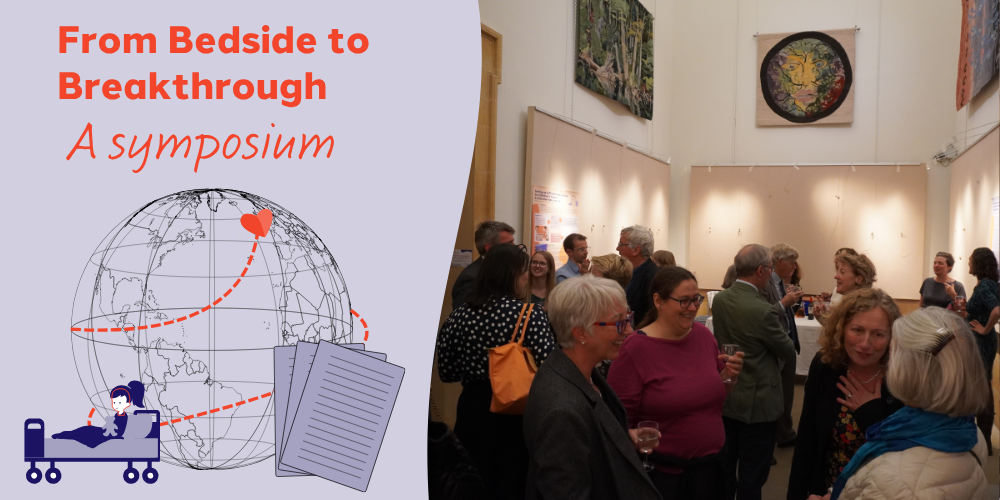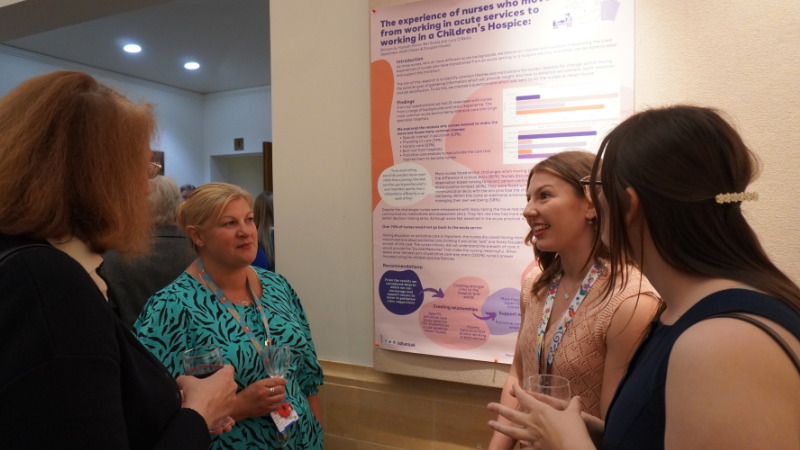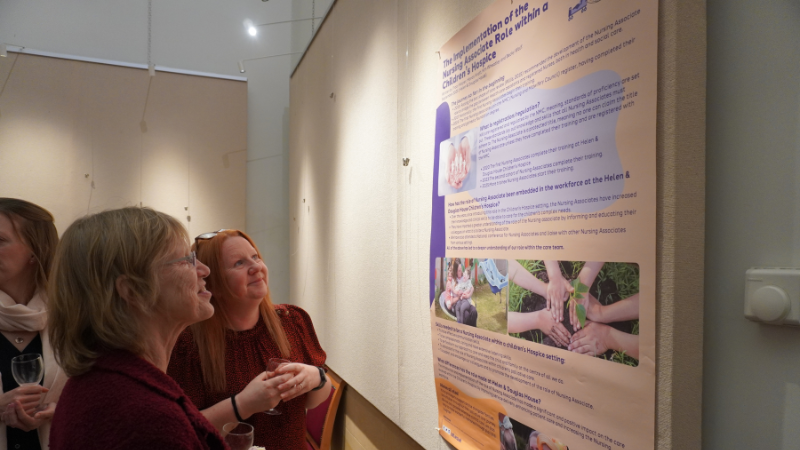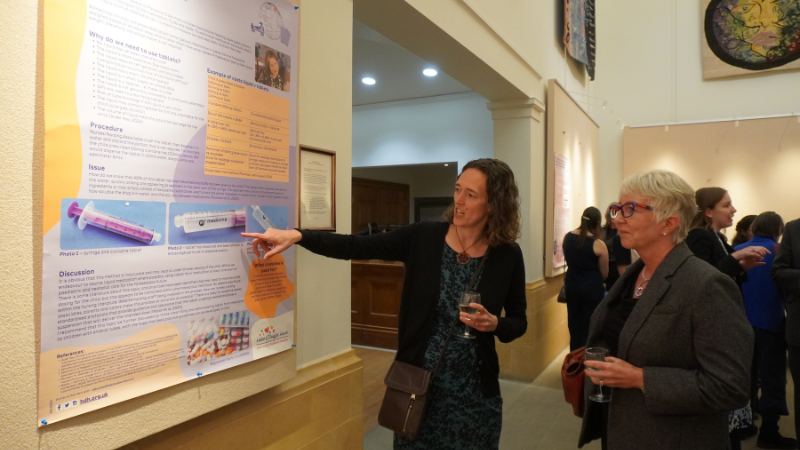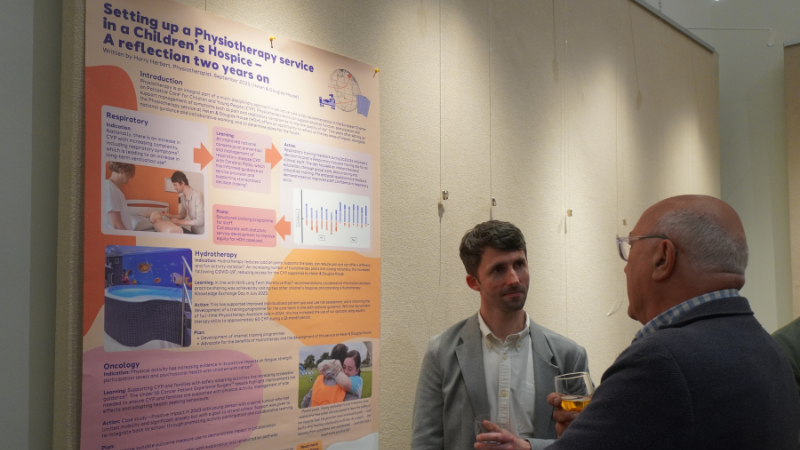In September, Helen & Douglas House hosted its first Symposium event at Magdalen College – From Bedside to Breakthrough. The evening was all about showcasing our groundbreaking research, and how this is improving the quality of care for children and their families, both at Helen & Douglas House and beyond. For over 40 years, we have pioneered the very best children’s hospice care in the UK. As the world’s first children’s hospice, Helen & Douglas House has gone on to inspire 54 others across the UK, and more around the world. We were the first to stand up and say children have a human right to a dignified death. From the very beginning we have ensured that our discoveries have been shared beyond Helen & Douglas House, and over the years our research has increased, both in the number of papers written and the complexity.
As well as discovering groundbreaking achievements and hearing powerful stories, the evening explored exciting plans shaping the future of this vital work. Taking to the stage and steering the evening’s main event were our panelists Dr Emily Harrop, Emily Tammam, Dr Bethan Page and Dr Tristan Johnston Wood who each gave insightful presentations on their areas of expertise, experience with Helen & Douglas House and the research they’re part of.

Dr Emily Harrop
Emily has been a Consultant in Paediatric Palliative Care at Helen & Douglas House Hospices since 2010, and the Medical Director since 2019. She is also an Honorary Consultant at Oxford University Hospitals NHS Trust. She is active in research in the field of pain & symptom management and mentors postgraduate research students in the field of palliative medicine.

Dr Bethan Page
Bethan is a Lecturer in children’s health and palliative care research at the Cicely Saunders Institute, King’s College London. Her research focuses on how to support children with medical complexity and their families.

Tristan Johnston-Wood
Tristan Johnston-Wood is medical student (Graduate-entry) at the University of Oxford. He has been collaborating with Dr Emily Harrop and Dr Charlotte Holland since 2024, researching how communication skills, in the context of parents of critically ill children, are taught to medical students across the UK.

Emily Tammam
Emily is a bereaved mother to Neve, who was cared for by Helen & Douglas House. She is actively involved in paediatric palliative care research as a PPI contributor. She is the parent co-chair of the Southwest NHSE PPI group and the APPM PPIG group.
Research written by hospice staff
Research at Helen & Douglas House isn’t just conducted by our Doctors, but is encouraged throughout the care team. At the start of the evening, Helen & Douglas House nurses and specialist practitioners showcased their research posters, giving attendees the opportunity to speak to them directly about their work. The research showcased included:
- The journey of setting up a physiotherapy service at the hospice written by our physiotherapist Harry.
- Exploring accuracy of administering small doses written by Practice Development Nurse, Ruth.
- The experience of moving from acute nursing services to working in a children’s hospice. written by nurses Lucy, Hannah and Bex, and,
- The implementation of the nursing associate role within a children’s hospice written by nurses Tracy, Mandy, Kim and Becky. The room was buzzing with curious chatter and knowledge sharing.
Presentations by the panelists
Opening the presentation section of the evening was our Chair of Trustee’s Jennie Younger who said that the night represented a celebration of something special: the way compassionate care can lead to pioneering research that shapes the future of children’s palliative care. Not just here but across the UK and internationally. It is this research that is one of the main pillars of our organisational strategy steering our organsation forward with a research-first approach to children’s palliative care.
The first panel speaker was Dr Emily Harrop, who took everyone back to the beginning of Helen & Douglas House’s research journey – to 1982 where an article from the British Medical Journal on the hospice’s first year recorded that 52 children received care that year and that the hospice was already being regarded as ‘Neither a sombre, nor depressing place’ – something that many families today would agree with. By the early 90’s, our caseload increased dramatically, and collaboration was soon on everyone’s minds. Collaboration and comparison to adult hospice services also led to a piece written to adult teams telling them how they could learn from emerging practices at Helen & Douglas House.
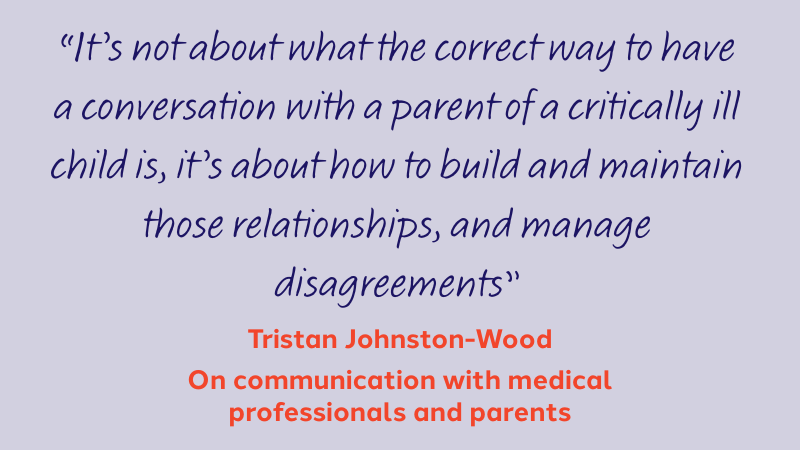
Emily Tammam followed and as the parent and a Patient and Public Involvement (PPI) contributor. Her journey and experience with palliative care and research is a very personal one. Her daughter Neve died aged 10 from brain cancer after being diagnosed in 2020 aged 7. Despite being in awe of medical research and the palliative care she received at Helen & Douglas House, she felt disconnected from most oncology research. The focus on trials, prevention and treatments didn’t feel relevant to Emily. But in 2021, Dr Emily Harrop suggested she used her lived experience with Neve to inform children’s palliative care research and while initially hesitant, she hasn’t looked back since. Since Neve’s death, Emily has gone on to write, draw, paint and speak about her lived experience with a mission to prove that you don’t need a PHD to be a researcher. You can also be a mum. She closed by saying that Neve always wanted to be a doctor and to help other children like her when she grew up. And through Emily telling her story, she’s helping so many more children both today and in the future.
Dr Bethan Page spoke next about her involvement with Helen & Douglas House. She was inspired by a visit to the hospice which sparked her interest in conducting research with parents of terminally ill children. She helped gather vital information from parents about their experiences coping at home doing medical procedures which led to fascinating and poignant insights and even sparked the creation of a library of video resources on gastrostomy care and how to manage this at home. A library that involved Helen & Douglas House staff and families which was subsequently watched and appreciated by thousands online.
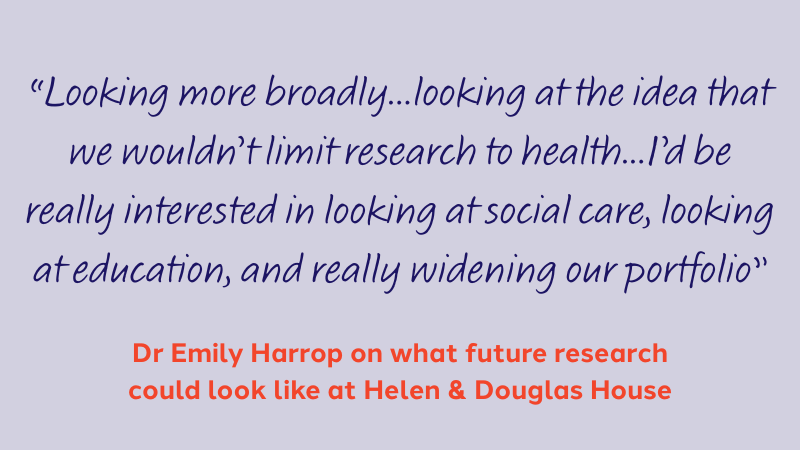
And finally, Tristan Johnston-Wood spoke about his experience as a current medical student at Oxford University. He spoke in depth about his own discoveries around communication between medical professionals and parents and how miscommunication can lead to confusion, frustration and conflict. He then spoke about a survey done which focused on 4 areas of communications within healthcare settings. The results revealed a shocking under-development of communications training within medical schools with around 50% not offering complex communication training. When asked whether they felt unprepared during communication with parents of a critically ill child, more than 50% said they had on at least one occasion. Tristan’s work in this area could eventually lead to big changes with recommendations for children’s palliative care training across the UK in the future.
To close the evening, Helen & Douglas House CEO David Whittingham reflected on how the research shown across the evening from parents, doctors and nurses was a perfect reflection of Helen & Douglas House’s strives to innovate with compassion and collaboration.
Feedback from attendees
“It was an excellent way to bring us up to the present methods with which palliative care is being provided and evolving for the future.”
– Ian Richens
“I thought the panel was incredible”
– Ruth Bevington
What does the future hold?
So much can be learned and improved from research and collaboration, and that’s why research is one of the main pillars of our organisational strategy. Our legacy of pioneering research within the paediatric palliative care space goes back to our very beginning and it’s a legacy everyone is committing to building upon. The future is investing in research and expending our educational reach, and it’s a future we cannot meet without support from people like you.
After the huge success of this years Symposium, we will be holding another next year. You can register your interest on the form below
Please use this form to register your interest in our 2026 Symposium. We'll be in touch with further information.Symposium 2026 - Register your interest
